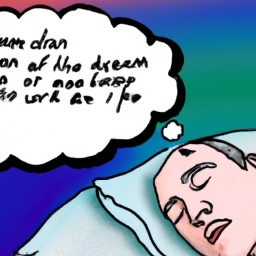It is entertaining to notice how often we encounter people stating, “I never dream” or “I can’t remember my dreams.”
As someone who has vivid and memorable dreams every night, I find it hard to imagine a life without them. But the truth is, not everyone experiences dreaming in the same way or at all.
So why do some people not have dreams?
As I delved into this topic, I found that there are a multitude of reasons why some individuals do not dream as frequently or vividly as others. From neurological conditions to cultural beliefs, there’s no one-size-fits-all answer.
In this article, we’ll explore the various factors that can impact an individual’s ability to dream and what research suggests about these phenomena.
Key Takeaways
- Different factors can contribute to why some people do not experience dreams as frequently or vividly as others, including medical conditions, brain disorders, sleep disorders, medications, substance abuse, aging, poor dietary habits, and inadequate sleep hygiene.
- Dreaming plays an important role in memory consolidation, emotional regulation, and problem-solving abilities, and the vast majority of people dream every night during their sleep cycle.
- Lifestyle factors such as diet, sleep patterns, and technology use before bed can affect dream content and frequency, as can cultural and religious beliefs, spiritual practices, and personality traits.
- Dream recall and journaling can improve dream recall and help individuals track patterns and recurring themes, providing insight into subconscious thoughts and emotions. Dream suppression techniques may not be beneficial in the long term and can have negative consequences on mental health.
Definition of Dreams and Sleep States
When we fall asleep, our minds enter into different sleep states that are responsible for producing dreams. These stages of sleep are characterized by distinct patterns of brain activity that influence the content and intensity of our dreams. However, not everyone experiences dreams during their sleep.
There can be several causes of dreamless sleep. Some people may have a medical condition such as narcolepsy or insomnia that affects their ability to dream. Others may be taking medications that suppress dreaming or alter the brain’s sleep cycles. The effects of dream deprivation can vary from person to person, but it’s generally believed that dreaming plays an important role in memory consolidation, emotional regulation, and problem-solving abilities. Therefore, those who don’t experience dreams may miss out on these benefits.
Moving on to the prevalence of dreaming, it’s interesting to note that while some people don’t remember their dreams or experience them at all, others report having vivid and complex dreams every night. This discrepancy in dream frequency could be influenced by factors such as genetics, age, personality traits, and environmental stimuli.
Prevalence of Dreaming
Dreaming is a common occurrence among individuals, and it’s something that most of us experience regularly. According to prevalence data from scientific research, the vast majority of people dream every night during their sleep cycle. In fact, studies have shown that on average, we spend about two hours each night dreaming.
Despite this prevalence, there are some individuals who don’t remember or report having dreams. This could be due to individual differences in brain activity during sleep or a lack of attention paid to their dream experiences. Regardless of the reason behind it, understanding why some individuals don’t dream can provide insight into the importance and function of dreams in our lives.
Moving forward into the subsequent section on neurological conditions, we’ll explore how certain conditions can impact an individual’s ability to dream.
Neurological Conditions
Neurological conditions can significantly affect an individual’s ability to recall or experience dreams. Brain disorders such as Alzheimer’s disease, Parkinson’s disease, and multiple sclerosis have been found to contribute to dream loss. These conditions can disrupt the brain’s normal sleep patterns, leading to a decrease in REM (rapid eye movement) sleep – the stage of sleep where most dreaming occurs.
Sleep disorders also play a role in dream loss. Conditions such as insomnia and sleep apnea can interfere with the normal sleep cycle, leading to decreased REM sleep and ultimately affecting one’s ability to remember their dreams. Additionally, medications used to treat these conditions may also contribute to dream loss.
As we explore further into the topic of dreamlessness, it’s important to consider how medications and substance use can impact our dreaming experiences.
Medications and Substance Use
Medications and substance use can impact our ability to recall or experience dreams, affecting the visual content of our dream world. Certain medications, such as antidepressants, beta-blockers, and antihistamines, have been known to suppress REM sleep, which is the stage where most dreaming occurs. This means that even if a person does have dreams while taking these medications, they may not be able to remember them upon waking up.
Substance abuse can also have an impact on one’s ability to dream. Alcohol consumption before bedtime has been shown to reduce REM sleep and disrupt sleep patterns overall. Additionally, marijuana use has been linked to decreased REM sleep as well as changes in dream content. These effects may lead to less vivid or memorable dreams for those who engage in substance abuse.
Moving onto age and developmental factors…
Age and Developmental Factors
As I delve into the subtopic of age and developmental factors, I’m struck by two key points.
Firstly, infants and children experience critical brain development during their early years. This time is crucial for shaping cognitive processes such as dreaming.
Secondly, aging and senescence often bring changes in sleep patterns and dream content. These changes can have important implications for well-being in later life.
Understanding these developmental factors is crucial to gaining a deeper insight into why some individuals may not experience dreams.
Infants and Children
When you’re a child, you may not remember your dreams as vividly as adults do. This is partly due to the fact that infants and young children spend more time in REM sleep than adults do, which means they are dreaming more frequently throughout the night. However, since young children’s brains are still developing, they may not have the cognitive ability to remember their dreams once they wake up.
In fact, research has shown that infants have the highest percentage of REM sleep out of any age group, with up to 50% of their sleep being spent in this stage. As children get older and their brains continue to develop, the amount of time spent in REM sleep decreases gradually. By adulthood, only about 20-25% of our total sleep time is spent in REM sleep. Despite this decrease in overall dream frequency as we age, many people still report having vivid dreams well into old age.
Aging and Senescence
As we get older, our dreams may become more vivid and emotional, reflecting our life experiences and memories. However, it’s not uncommon for some individuals to report a decrease in dream frequency or even the absence of dreams altogether as they age.
Is this correlation between senescence and dreaming just a coincidence? Or is there a scientific explanation behind age-related changes in dream content?
Research shows that the brain undergoes significant changes during aging, which can affect various cognitive processes, including dreaming. As we age, the brain’s ability to produce certain neurotransmitters decreases, such as dopamine and acetylcholine. These chemicals play important roles in regulating REM sleep, which is when most vivid dreaming occurs.
Additionally, structural changes in the brain can also impact dream content. For example, aging can cause atrophy of certain brain regions responsible for processing visual information or memory consolidation – two components essential to dreaming.
Despite these biological factors affecting dream production during aging, research suggests that lifestyle factors may also contribute to individual differences in dream content among older adults.
Some possible lifestyle factors include physical activity levels and medication use – both of which have been linked to altered sleep quality and quantity among older adults. Another potential factor is psychological well-being; stress or anxiety can disrupt REM sleep and lead to fewer or less memorable dreams overall.
Thus, while senescence does play a role in changing our dreams over time due to physiological alterations within our bodies itself; lifestyle factors are crucial determinants of how much we continue having those vivid night-time adventures throughout our lives!
Lifestyle Factors
Living a hectic lifestyle can greatly decrease the chances of experiencing dreams. The hustle and bustle of everyday life can leave little time for quality sleep, which is essential for proper dreaming. Additionally, stress and anxiety caused by a busy lifestyle can also disrupt the natural cycle of sleep and dream patterns.
To better understand how lifestyle factors affect dreaming, it may be helpful to examine specific habits that could be contributing to dreamlessness. According to research, poor dietary habits and inadequate sleep hygiene are two common culprits. A diet high in processed foods, sugar, and caffeine can interfere with sleep quality, making it more difficult to enter REM sleep – the stage where most dreaming occurs. Similarly, irregular sleeping patterns or insufficient hours spent sleeping have been linked to decreased dreaming frequency. By prioritizing healthy eating habits and adopting good sleep hygiene practices such as sticking to a consistent bedtime routine and avoiding technology before bed, individuals may increase their likelihood of experiencing vivid dreams.
Transitioning into the subsequent section about cultural and religious beliefs: While lifestyle factors play a significant role in dreamlessness, cultural and religious beliefs may also impact an individual’s relationship with their dreams.
Cultural and Religious Beliefs
You can’t ignore the impact that cultural and religious beliefs have on your dreams.
In some cultures, dreaming is seen as a taboo or something to be feared. For example, in many Indigenous cultures, it’s believed that speaking about dreams will make them disappear or come true in a negative way. This means that individuals from these cultures may not actively recall their dreams or talk about them with others.
On the other hand, spiritual practices may also affect dream recall and content. Some religious traditions encourage dream interpretation as a means of communicating with higher powers or gaining insight into one’s life path. Alternatively, certain practices like meditation and mindfulness can increase awareness and focus during sleep, leading to more vivid dream experiences.
It’s important to recognize how cultural and religious beliefs shape our attitudes towards dreaming as well as how they influence our ability to remember and interpret our dreams.
As we move into exploring psychological factors that affect dream recall, it’s important to keep in mind how intertwined cultural and spiritual beliefs are with our subconscious experiences.
Psychological Factors
As I delve deeper into the topic of dreams and why some people may not experience them, I can’t help but consider the psychological factors that may play a role.
Specifically, I’m interested in exploring personality traits, trauma, and post-traumatic stress disorder (PTSD).
Through research-driven and objective analysis, I hope to understand how these psychological factors can impact one’s ability to dream or remember their dreams.
Personality Traits
If you’re not having dreams, it might be because of your unique personality traits. The debate between nature and nurture has been ongoing for years, but when it comes to dreaming, both play a significant role. Research shows that introverted individuals tend to have fewer dreams than extroverts. This could be because introverts tend to have a more active internal world and may not need the same level of stimulation from their dreams as extroverts.
Moreover, various studies suggest that personality traits such as neuroticism and openness also influence an individual’s dream life. Neurotic individuals tend to have more negative emotions in their waking life, which can translate into their dream world. On the other hand, those who score high on openness are more likely to have vivid and imaginative dreams due to their tendency towards creativity and unconventional thinking. Understanding one’s personality traits can be helpful in deciphering why some people do not experience dreams like others do. Moving onto the next subtopic about trauma and PTSD…
Trauma and PTSD
Experiencing trauma and PTSD can significantly affect an individual’s dream life. People who have experienced these conditions may struggle with recurrent nightmares and vivid flashbacks, which can make it difficult to get restful sleep.
Additionally, some individuals may experience PTSD-related amnesia, where they can’t remember certain aspects of the traumatic event or past experiences related to it. As a result of these experiences, people may consciously or subconsciously suppress their dreams as a way to protect themselves from potentially triggering memories.
Dream suppression techniques, such as avoiding certain topics before bed or using substances like alcohol or sleeping pills, can further inhibit dream recall. However, suppressing dreams isn’t always beneficial in the long term and can lead to other negative consequences in one’s mental health.
Transitioning into the subsequent section about ‘dream recall techniques,’ understanding how trauma affects our dreams is crucial for developing effective methods to improve dream recall and overall sleep quality.
Dream Recall Techniques
Using dream journals is a simple and effective technique for improving dream recall, as it allows individuals to track their dreams over time and notice patterns that may otherwise go unnoticed. It’s like having a flashlight in a dark room – the more you shine it around, the more you’ll see.
Here are some tips on how to effectively use dream journals:
-
Keep your journal by your bedside: This’ll make it easier to record your dreams as soon as you wake up.
-
Write down every detail: Even if it seems insignificant, write it down. This’ll help train your brain to remember more details in future dreams.
-
Be consistent: Try to write in your journal every morning, even if you don’t remember a dream from the previous night.
-
Reflect on your dreams: Take some time each day to reflect on your dreams and look for any recurring themes or symbols. This can provide insight into your subconscious thoughts and emotions.
By incorporating these techniques into your daily routine, you may be able to improve your ability to recall dreams and unlock the potential benefits of lucid dreaming and dream journaling.
Frequently Asked Questions
Are there any benefits to not having dreams?
Exploring cultural differences and examining physiological factors, research suggests that not having dreams is linked to certain medical conditions. However, there are no proven benefits to not having dreams for the average person.
Can lack of dreaming be a sign of a mental health condition?
As a mental health professional, I have seen cases where lack of dreaming could be indicative of an underlying condition. Causes and treatment vary depending on the individual, as does prevalence and demographics. Research-driven analysis is key in identifying and addressing these concerns.
Is it possible to train oneself to have more vivid dreams?
Yes, it is possible to train oneself to have more vivid dreams using lucid dreaming techniques and dream journaling. These methods can improve dream recall and allow for greater control over the content of one’s dreams.
Are there any correlations between dream content and personality traits?
Research suggests that common dream themes may be linked to certain personality traits, such as high levels of anxiety or creativity. Cultural influences also play a role in shaping dream content. Understanding these connections can aid in personal growth and self-awareness.
Can environmental factors, such as noise or light, affect dream frequency or content?
Environmental factors such as noise and light can affect sleep quality, leading to less dream frequency. Medication effects may also alter dream content. Research suggests these external factors play a role in shaping our dreams.
Conclusion
In conclusion, the reasons why some people don’t have dreams are multifactorial and can vary from neurological conditions, medications, and substance use to age, developmental factors, lifestyle, culture, religion, and psychology. It may seem like a dreamless life is missing out on something crucial, but it’s essential to remember that dreaming is a natural occurrence during sleep.
I can’t imagine living without dreams as they provide me with an escape from reality. However, it’s important to understand that each person’s experience with them differs. Whether you remember your dreams vividly or rarely have one at all, what matters most is the quality of your sleep.
If you find yourself struggling with insomnia or want to improve your dream recall techniques, remember that there are resources available to help you achieve a restful night’s sleep.










